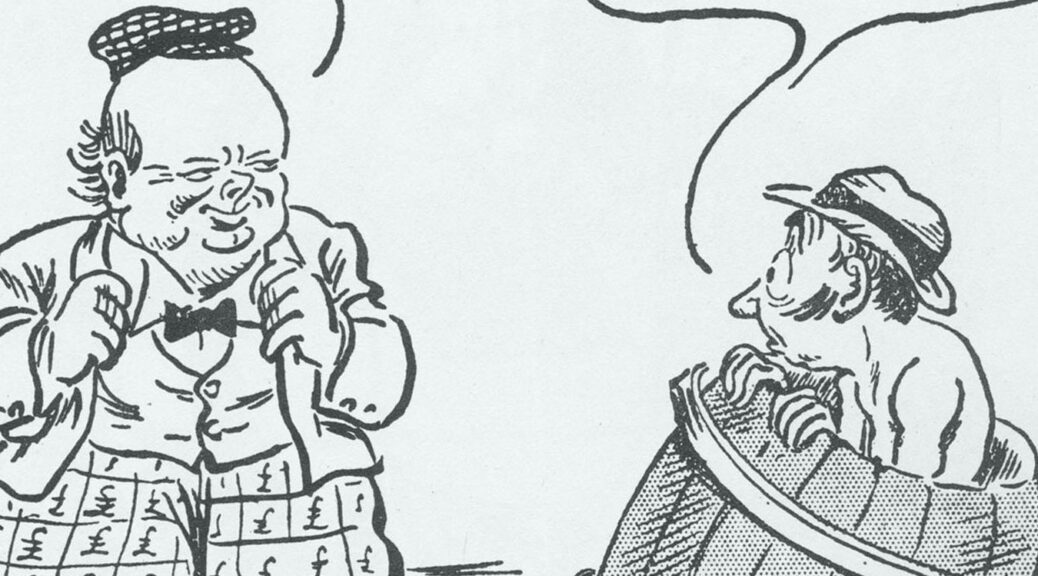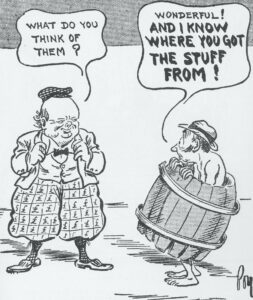
Squandermania: Churchill on Debt Limits
We have lost count of how many debt limits have been raised by the U.S. and other governments since this set of quotations was first published in 2009. And another quarrel about is on the table. So the title is now plural. Churchill’s evergreen views on national debt apply any time, anywhere.
Q: What did he say about the debt?
What did Sir Winston Churchill say about spending limits and piling up the national debt? —E.R., New Orleans
A: Many things, mostly consistent

No, Sir Winston will not interrupt his first million years to comment on the national debt. And I’m not going to suggest what he would think about it. Heaven forbid. I just sifted through Churchill by Himself for applicable quotations to answer your question. Chronological order. Draw your own conclusions.
In your pocket, out his…
You may, by the arbitrary and sterile act of Government—for, remember, Governments create nothing and have nothing to give but what they have first taken away—you may put money in the pocket of one set of Englishmen, but it will be money taken from the pockets of another set of Englishmen, and the greater part will be spilled on the way. (Birmingham Town Hall, 11 November 1903)
Where you find that State enterprise is likely to be ineffective, then utilise private enterprises, and do not grudge them their profits. (St. Andrew’s Hall, Glasgow, 11 October 1906)
Every new administration, not excluding ourselves, arrives in power with bright and benevolent ideas of using public money to do good. The more frequent the changes of Government, the more numerous are the bright ideas; and the more frequent the elections, the more benevolent they become. (On Debt, House of Commons, 11 April 1927)
“Squandermania”
There are two ways in which a gigantic debt may be spread over new decades and future generations. There is the right and healthy way; and there is the wrong and morbid way. The wrong way is to fail to make the utmost provision for amortisation which prudence allows, to aggravate the burden of the debts by fresh borrowings, to live from hand to mouth and from year to year, and to exclaim with Louis XV: “After me, the deluge!” (House of Commons, 11 April 1927)
Lord Rothermere, chief author of the anti-waste campaign, has enlisted under the Happy Warrior of Squandermania. The detailed methods of spending the money have not yet been fully thought out…. But if only enough resource and energy are used there will be no difficulty in getting rid of the stuff. This is the policy which used to be stigmatised by the late Mr. Thomas Gibson Bowles as the policy of buying a biscuit early in the morning and walking about all day looking for a dog to give it to. (Debt Policy, House of Commons, 15 April 1929)
Easy go, easy come
Democratic governments drift along the line of least resistance, taking short views, paying their way with sops and doles, and smoothing their path with pleasant-sounding platitudes. Never was there less continuity or design in their affairs, and yet toward them are coming swiftly changes which will revolutionize for good or ill not only the whole economic structure of the world but the social habits and moral outlook of every family. (“Fifty Years Hence,” Strand Magazine, December 1931)
I do not think America is going to smash. On the contrary I believe that they will quite soon begin to recover. As a country descends the ladder of values many grievances arise, bankruptcies and so forth. But one must never forget that at the same time all sorts of correctives are being applied, and adjustments being made…. If the whole world except the United States sank under the ocean, that community could get its living. They carved it out of the prairie and the forests. They are going to have a strong national resurgence in the near future. Therefore I wish to buy sound low-priced stocks. I cannot afford any others. (To stockbroker H.C. Vickers, 21 June 1932)
Hope and change
Change is agreeable to the human mind, and gives satisfaction, sometimes short-lived, to ardent and anxious public opinion. (House of Commons, 29 July 1941)
Nothing would be more dangerous than for people to feel cheated because they had been led to expect attractive spending schemes which turn out to be economically impossible. (To Foreign Secretary, Paymaster General and President of the Board of Trade, 17 December 1942)
I do not believe in looking about for some panacea or cure-all…. It is easy to win applause by talking in an airy way about great new departures in policy. Especially if all detailed proposals are avoided. (Blackpool, 5 October 1946)
Liberty vs. serfdom
The idea that a nation can tax itself into prosperity is one of the crudest delusions which has ever fuddled the human mind. (Royal Albert Hall, 21 April 1948)
Socialism is the philosophy of failure, the creed of ignorance, and the gospel of envy. (Perth, 28 May 1948)
The choice is between two ways of life: between individual liberty and State domination; between concentration of ownership in the hands of the State and the extension of ownership over the widest number of individuals; between the dead hand of monopoly and the stimulus of competition; between a policy of increasing restraint and a policy of liberating energy and ingenuity; between a policy of levelling down and a policy of opportunity for all to rise upwards from a basic standard. (Wolverhampton, 23 July 1949)
Acknowledgments
Churchill quotations by kind permission of Curtis Brown Ltd. and reprinted from Churchill by Himself. Cartoon courtesy Tim Benson, Political Cartoon Gallery, London.
See also: “Poy (Percy Fearon): Churchill’s Classic Cartoonist,” 2022.







One thought on “Squandermania: Churchill on Debt Limits”
Brilliant!
Comments are closed.